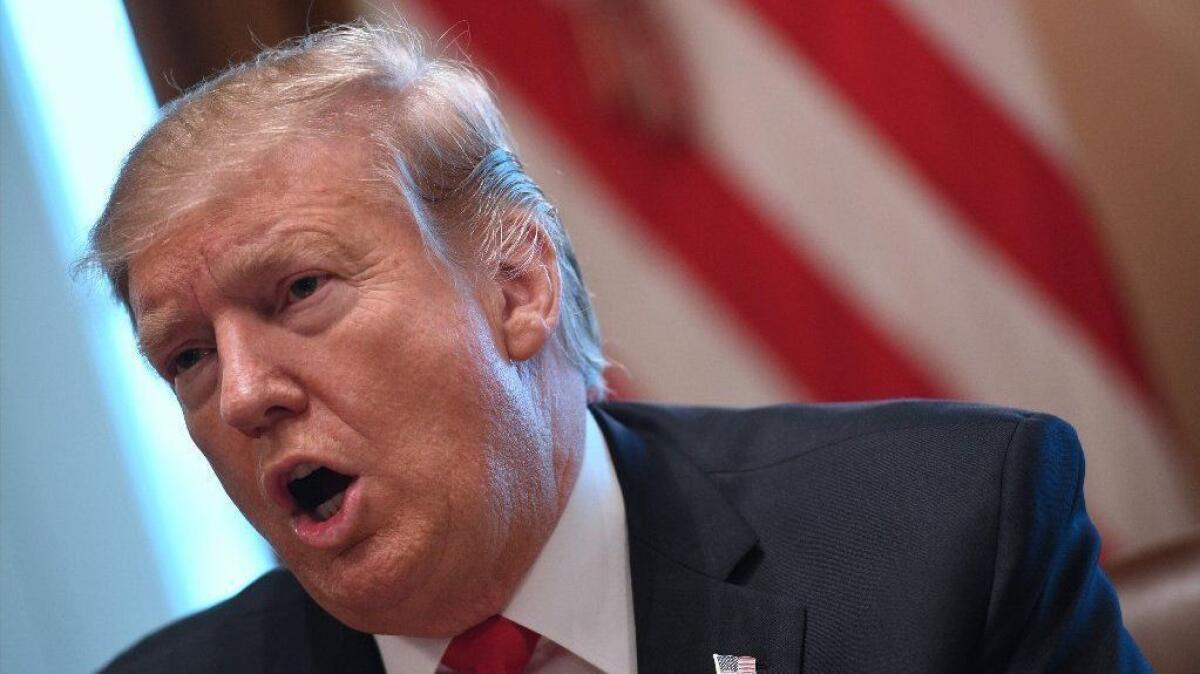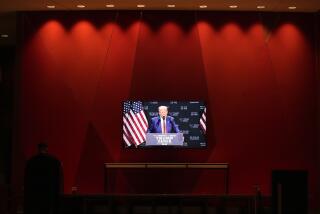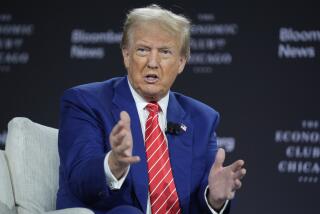Trump says he’ll reject U.S. intelligence assessments he disagrees with

Reporting from Washington — Despite growing foreign-policy misgivings about him even within the GOP, President Trump insisted in an interview aired Sunday that he feels free to ignore the assessments of his intelligence chiefs and instead act on his own beliefs.
In a wide-ranging interview aired on CBS’ “Face the Nation,” the president also appeared to soften his claim that the senior intelligence officials who testified before Congress last week subsequently told him their views had been distorted in news reports.
Their televised testimony contradicted Trump’s positions on a variety of subjects and was followed by scathing presidential Twitter attacks on those same officials.
“I have intel people, but that doesn’t mean I have to agree,” he said in the CBS interview. He cited past U.S. intelligence mistakes regarding Iraq’s weapons of mass destruction and what he seemed to suggest was their underestimating now of the threat posed by Iran.
“So when my intelligence people tell me how wonderful Iran is, if you don’t mind, I’m going to just go by my own counsel,” he said.
Although the White House has suggested that Tuesday’s prime-time State of the Union speech — delayed for a week by the 35-day partial government shutdown — will be bipartisan in nature, Trump took a combative tone in the CBS interview.
He denounced House Speaker Nancy Pelosi as a danger to the nation and said he doesn’t rule out another shutdown or an emergency declaration to try to get his way on a border wall.
Trump said Pelosi, the San Francisco Democrat who will sit behind him as he delivers his address to a joint session of Congress, is “doing a terrible disservice to our country” on border security.
“She can keep playing her games, but we will win,” he said.
Pelosi and her House Democrats forced an end to the shutdown after refusing to yield to Trump’s demand for $5.7 billion in funding for his desired wall. The president has since spoken dismissively of bipartisan negotiations now underway aimed at finding areas of agreement on border security and immigration policy.
With government funding in place until Feb. 15, Trump said he wouldn’t rule out another shutdown, or a declaration of emergency, to try to secure wall money. Public opinion polls suggest both courses of action would be unpopular.
“I don’t take anything off the table,” the president told CBS. He added that there have been “plenty of national emergencies called” in the past and suggested he might brush aside predictions that such a declaration would face a speedy court challenge.
Trump’s unprecedented public excoriation of his senior intelligence appointees last week — he called them “naive” and said they needed to “go back to school” — came amid increasing unease within Republican ranks over White House foreign policy decisions viewed by some as impetuous and ill thought-out.
In hours of testimony on Tuesday, intelligence leaders including Director of National Intelligence Dan Coats and CIA chief Gina Haspel said North Korea was unlikely to give up its nuclear weapons, stated that Iran is for the most part in compliance with the nuclear accord that Trump spurned, and described the militants of Islamic State as a potent regional menace.
They also pointedly refrained from describing the situation on the southern border as a security threat, as the president has repeatedly characterized it.
In the intervening days, not only Democrats but some senior Republicans have opined that disregarding nonpartisan intelligence assessments is a perilous path for any president.
The latest such admonition came from Sen. Ron Johnson, the Wisconsin Republican who chairs the Senate Committee on Homeland Security. In an interview on “Fox News Sunday,” he urged Trump to pay close attention to the intelligence community’s counsel.
“You have to rely on people who have been working these issues for decades,” Johnson said. He called it “just imperative that you actually listen to, for example, the CIA chief, the director of national intelligence.”
The Senate voted on Thursday to rebuke Trump over his abrupt decision, absent any congressional hearings or consultation with allies, to pull U.S. military forces from Afghanistan and Syria. In the “Face the Nation” interview, however, the president played down those concerns.
On Syria, he declared, “you now have very little ISIS,” using an acronym for Islamic State. Regarding Afghanistan, he said, “I want to bring people home,” and questioned whether the U.S.-led invasion following the 9/11 attacks should have taken place.
And when asked about the potential resurgence of terror groups like Al Qaeda in the Middle East, Trump said U.S. forces could always go back if needed. “We have very fast airplanes; we have very good cargo planes,” he said.
The president responded with a measure of sarcasm in disagreeing with intelligence assessments of Iran’s compliance with the landmark nuclear accord. “My intelligence people, if they said in fact that Iran is a wonderful kindergarten, I disagree with them 100%,” he said.
Trump did appear to back down slightly on his depiction of an Oval Office encounter last week with the intelligence chiefs following their congressional appearance. He said at the time that the officials had been “misquoted” in media reports, although their testimony was carried on live television.
“I’m not going to stop them from testifying,” he told interviewer Margaret Brennan. “They said they were mischaracterized — maybe they were, maybe they weren’t. I don’t really know.”
Turning to the Russia investigation by special counsel Robert S. Mueller III, Trump fell back on familiar descriptions of the probe as a “witch hunt.” He said he would let the attorney general make a determination as to whether Mueller’s report would be released to the public.
He sidestepped a question about whether he would pardon Roger Stone, his longtime confidant who was arrested in an FBI raid and last week pleaded not guilty to seven charges related to the Russia investigation.
“I have not thought about it,” Trump said of pardon prospects for Stone. “It looks like he’s defending himself very well.”
More to Read
Sign up for Essential California
The most important California stories and recommendations in your inbox every morning.
You may occasionally receive promotional content from the Los Angeles Times.










